Fairy Tales & Fables Part 1: Little Red Riding Hood, The Three Billy Goats Gruff, & The Three Little Pigs
There are so many reasons for parents to read fairy tales and fables to young
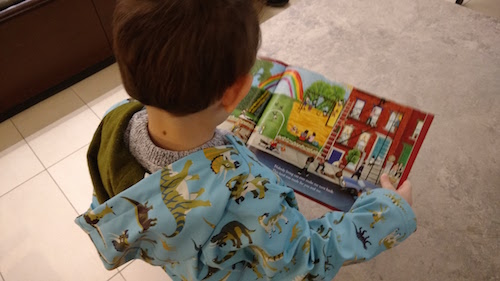
This morning as I readied my son Harry for the bus to his autism preschool, I thought hard about a question my friend Susan had posted on Facebook the night before: "What do I say to my daughter?"
Her situation is quite different. Her child, who is the same age as Luke and Harry, is typically developing, Latina, and understands enough about this election to require a real explanation. She will have questions. She will have fears.
Luke and Harry don't know there was an election. They don't know who Donald Trump is. They don't know who Hillary Clinton is. They are unaware that one candidate mocked a disabled reporter while the other put forward the first comprehensive proposal to address the needs of people with autism. They are blissfully unconcerned about what it might mean to be the children of a two-mom family in this new, uncertain America. And part of me thinks: Thank God. Because what child at 4 needs that anxiety?
But all of this presents a very peculiar kind of challenge. It's a challange that I always knew was awaiting me as a parent of two small children with autism, but not with such urgency: I must find a way to communicate my values to my children.
Luke and Harry are just as much a part of this society as anyone else. And like all kids they will grow up, and they will develop opinions and impact the people around them, and be impacted (too much I'm afraid) by the laws and policies and examples set in our highest offices; and yes, unless they want to deal with my wrath: they too will vote.
So, as Harry and I jumped on the elevator to the lobby this morning, I grabbed my copy of "This Land is Your Land" a hardcover picture book adaptation of the Woody Guthrie folk song with gorgeous paintings by Kathy Jakobsen. And waiting for the bus, I opened it up, and Harry let me sing it to him. When I finished, I noticed that two other parents with small children had stopped behind the chair we were sitting in and were listening. One mother was crying.
Nobody living can ever stop me,
as I go walking that freedom highway;
Nobody living can ever make me turn back;
This land was made for you and me.
I plan to do a series of posts over the next 6 months as I concentrate more on how to teach values with books to kids with autism. But for now, here's tonight's bedtime lineup:
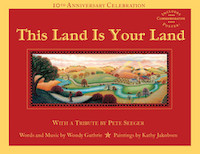

(Little, Brown and Company, 2008); hardcover, $18.00 USD
What works about this book for a child with autism, is that it's a singalong book that rhymes and has a simple, repeating chorus. In terms of language acquisition, Harry and Luke are both working on their pronouns right now, so it's a nice opportunity to practice the possessive pronouns ("This land is your land, this land is my land" - perhaps reinforced with a finger point). The paintings are bright and interesting and fabulous in their detail with lots of opportunities to tact people and aspects of rural and urban landscapes. I also like that it introduces some very basic American geography. I haven't done that yet, and it's time.
Of course, the real value of this book is the basic idea that this country belongs to all of us, including those with less, and that the rich and powerful can't put up signs that say it doesn't. The message is powerful, simple, and yet completely digestible: "This land was made for you and me."
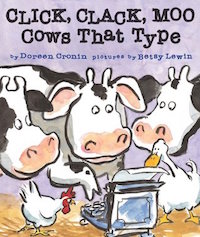

(Little Simon, 2000); paperback, $9.99 USD
This Caldecott Honor book is so well-loved in our home that nearly every page is held together by packing tape. It works because it's got animal characters making animal sounds, funny illustrations, and a super-silly repeating line: "Click, clack, moo. Click, clack, moo. Clickety clack, moo." It's almost impossible not to giggle as you read it. The setting and character cast are also familiar: a farmer, his animals, and a barn. It also introduces a few basic things about farm animals; milk comes from cows, eggs from chickens.
The plot is incredibly simple for a story about workers going on strike: The barn is cold and the cows want blankets. The farmer says no, so the cows go on strike. Then the chickens go on strike too. ("No milk! No eggs!") In the end, the animals get their blankets.
I fear the dismantling of worker protections across this country, and I'm very happy that I have a simple picture book that I can use to begin to teach my children about labor rights.
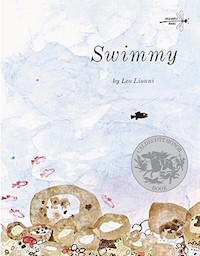

(Dragonfly Books, 1973); paperback, $7.93 USD
Leo Lionni was the first author/artist to use collage as his main medium for children's book art. His books are visually stunning and unique. "Swimmy" is another Caldecott Honor book, and one of my childhood favorites. The copy I read to Luke and Harry is the same one my mother read to me in the early 80s.
The text doesn't rhyme, repeat, and it isn't simple enough for the receptive language skills of my kids. So I'm not actually reading it straight, which, right now, is just fine. In fact, I should probably use more books this way. It's good for children with scripting issues (which is true of both Luke and Harry) to experience stories that are told in many different ways. Many ABA therapists have told me to read Harry, in particular, books without words, so that he is forced to engage with them as narrative without falling back on memorized lines. And that's how I read this book to him.
Swimmy is a classic story about the many oppressed coming together to defeat the oppressor. Swimmy is a tiny black fish and in the opening pages of the book his entire family is eaten by a terrifying, huge tuna. "Scared, lonely, and very sad" he wanders the ocean, seeing its marvels, until he finds a school of tiny red fish, hiding in rocks and weeds, afraid to swim in the ocean. Swimmy teaches them all to swim together in the shape of an even bigger fish, and he positions himself as the black eye in this optical illusion. When the big tuna returns, they scare it away.
"Swimmy" is unquestionably dark--but poignant. Harry loves ocean creatures and while I don't know how much of the plot he is picking up yet, he loves to talk about the action on each page, and he seems to delight in the ending when the tuna is scared away.
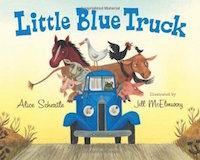

(HMH Books, 2008); hardcover large format, $17.99 USD
Be good to each other.
Last week, I would have hesitated to put a picture book with so hopelessly non-radical a message on a list of "progressive" picture books. But that was last week.
"Little Blue Truck" is a great book to interest children who love vehicles and animals. Anthropomorphic cars and trucks have been a hit in our home since we first introduced the boys to the Pixar Cars universe, and this book leverages that interest. Schertle is a talented poet and the book has great meter and rhyme and it's easy for children to anchor themselves in that structure.
I was first introduced to this book by Harry's ABA therapist Daisy. We had a mini circle time in our apartment with Luke and Harry to get them used to the idea of being read to in a group of peers before they attended preschool. Whenever the Little Blue Truck would "BEEP!" Daisy would put up her hand and the boys would take turns saying "BEEP!" and honking the imaginary horn with her. It was a simple, ingenious way to promote turn taking and intraverbal interaction, particularly with Luke who at the time wasn't capable of much more speech than a sound like that.
The story of "Little Blue Truck" is a simple parable about not thinking you are better than others and always being kind, even to not-nice Dump Trucks. Dump Truck rudely tears through the farm community where the animals and Little Blue Truck live, making it clear that he doesn't think much of them. Of course, he gets stuck in the mud and it takes Little Blue Truck's leadership to convince all the farm animals (who don't initially want to help him) to get Dump out of the mess. Naturally, from this experience Dump Truck learns the value of community.
I have a very strong feeling that there are a large number of working class Americans who are about to feel a heck of a lot like the Dump Truck. And hopefully there will be a lot of Little Blue Trucks who will take pity and get their friends to come together and get us all out of the mud.
It's a little on the nose, right?